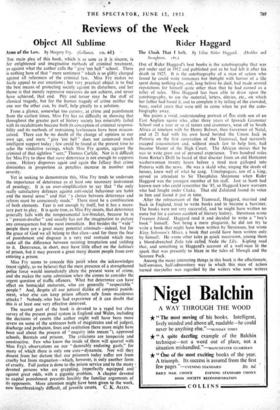Reviews of the Week
Object All Sublime
Arms of the Law. By Margery Fry. (Gollancz. us. 6d.) The main plea of this book, which is as sane as it is sincere, is for enlightened and imaginative methods of criminal treatment, as against what the author calls the " give 'em hell " school. There is nothing here of that " mere sentiment " which is so glibly charged against all reformers of the criminal law. Miss Fry makes no facile appeal to our emotions ; her very practical object is to find the best means of protecting society against its disturbers, and her theme is that merely repressive measures do not achieve, and never have achieved, that end. Pity and terror may be the stuff of classical tragedy, but for the human tragedy of crime neither the one nor the other can, by itself, help greatly to a solution.
From a glance, somewhat too cursory, at crime and punishment from the earliest times, Miss Fry has no difficulty in showing that throughout the greater part of history society has miserably failed with its recalcitrants because both its conception-of criminal responsi- bility and its methods of restraining lawlessness have been miscon- ceived. There can be no doubt of the change of opinion in our own age, and mere " give 'em hell " does not command much intelligent support today ; few could be found at the present time to echo the vindictive ravings, which Miss Fry quotes, against the criminal of that sightless " seer," Thomas Carlyle. Nor is it difficult for Miss Fry to show that mere deterrence is not enough to suppress crime. History disproves again and again the fallacy that crime diminishes in proportion as penalties increase in number and severity.
Yet in seeking to demonstrate this, Miss Fry tends to underrate the importance of deterrence as at least one necessary instrument of penology. It is an over-simplification to say that " the only really satisfactory defences against anti-social behaviour are habit and the moral sense " and that " a choice between deterrence and reform must be consciously made." There must be a combination of both elements. Fear is not enough by itself, but it has a neces- sary part to play. It is quite true, as Miss Fry insists, that deterrence generally fails with the temperamental law-breaker, because he is a " present-dweller " and usually has not the itnagination to picture any consequences but the most immediate. But besides the " wide " people there are a great many potential criminals—indeed, but for the grace of God we all belong to that class—and for them the fear of punishment and disgrace is a very real restraint which may make all the difference between resisting temptation and yielding to it. Deterrence, in short, may have little effect on the habitues of prison, but it may prevent a great many decent people from ever entering a prison.
Miss Fry seems to concede this point when she acknowledges (most rightly, as we believe) that the mere presence of a strengthened police force would immediately abate the present wave of crime, and she makes the same admission when she comes to consider the urgent question of traffic offences. What but deterrence can have effect on homicidal niotorists, who are generally " respectable " people ? And, despite all our natural dislike of corporal punish. ment, what else can keep prison officers safe from murderous attacks ? Nobody -who has had experience of it can doubt that this is at least one very effective deterrent.
The second part of the book is devoted to a rapid but clear survey of the present penal system in England and Wales, including the decisions of courts (the author might well have been more severe on some of the sentences both of magistrates and of judges), discharge and probation, fines and restitution (here more might have been said about the process of " enquiry into means "), approved schools, Borstals and prisons. The criticisms are temperate and constructive. Few who know the inside of them will quarrel with Miss Fry.:s observations on our "damnably enduring gaols," for many of, which there is only one cure--dynamite. Nor will they dissent from her dictum that our prisoners today suffer not from cruelty but from stagnation—which, however, is only another form of cruelty. Full justice is done to the prison service and to the many devoted persons who are grappling, imperfectly equipped and against great odds, with a gigantic problem. A chapter devoted to capital punishment presents forcibly the familiar arguments of its opponents. More attention might have been given to the work, now heartbreakingly difficult, of juvenile courts. C. K. ALLEN.


































 Previous page
Previous page